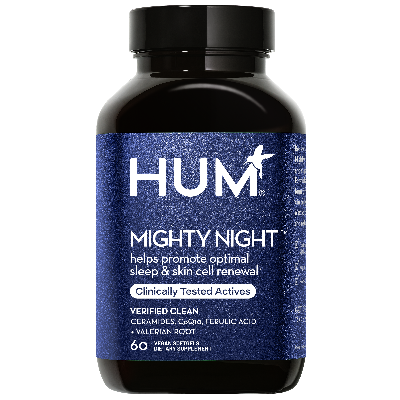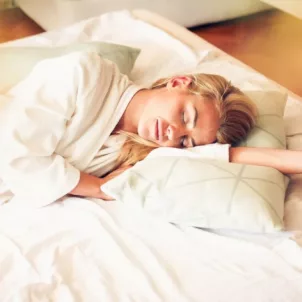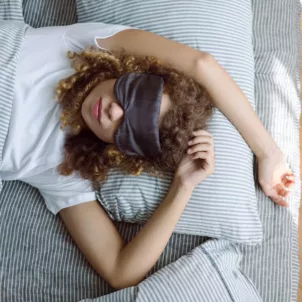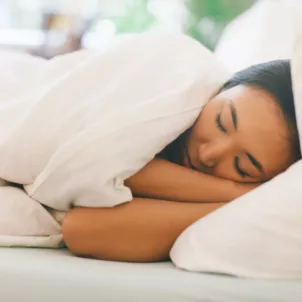We’ll admit it: We’ve become a little sleep obsessed since the launch of our newest product, Mighty Night. To perfect the art of optimal beauty sleep, we consulted Michael Breus, PhD, aka the Sleep Doctor™. Here, he explains the science behind beauty sleep along with five tips for optimizing your sleep routine.
How Sleep Works
You cycle through five different phases of sleep each night. Phases one and two are lighter phases of sleep. REM is where mental restoration occurs. By contrast, phases three and four are much deeper and where physical restoration occurs. “Phases three and four really are beauty sleep,” Dr. Breus confirms. In these stages of deeper sleep, your blood pressure drops, your muscles become very relaxed, and your body releases growth hormones. “That’s the cellular repair. I liken it to bringing your car into the body shop and getting the dinks and dents pulled out every single night,” Dr. Breus explains. This stage is so important that if you’re ill or have a physical injury, stages three and four will lengthen so your body can recover faster.
What Happens When We Don’t Get Enough Sleep?
Sadly, when we don’t get enough sleep, we really do pay for it. “For some women, lack of sleep can actually worsen acne, rosacea, and other conditions of that nature,” Dr. Breus warns. He also shares an interesting study from the Journal of Investigative Dermatology that claims that the skin of sleep-deprived women are more susceptible to outside allergens and bacteria. Another study from the British Medical Journal reports that when given a choice, people simply thought individuals with more sleep looked more attractive. Other studies show that poor sleep can result in dehydration, wrinkles, and other signs of aging. One reason may be that the skin’s capacity to hold water is actually enhanced in the third and fourth stages of sleep.
But Do We Really Need Eight Hours?
Not necessarily. Dr. Breus explains that most people pass through all five phases of the sleep cycle within about 90 minutes. Then, the average person has five sleep cycles in total in the course of one evening. When you do the math, that means most people actually require seven-and-a-half hours of sleep instead of the traditional eight that’s often recommended at rote.
With that said, this number can vary for everyone. For instance, Dr. Breus discovered in his sleep lab that his sleep cycle takes 81 minutes instead of 90. That means he only requires 6.75 hours of sleep per night. And while not all of us have access to a sleep lab, he recommends learning more about your personal sleep cycle by using sleep-tracking devices or apps and following these universal tips for better beauty sleep.
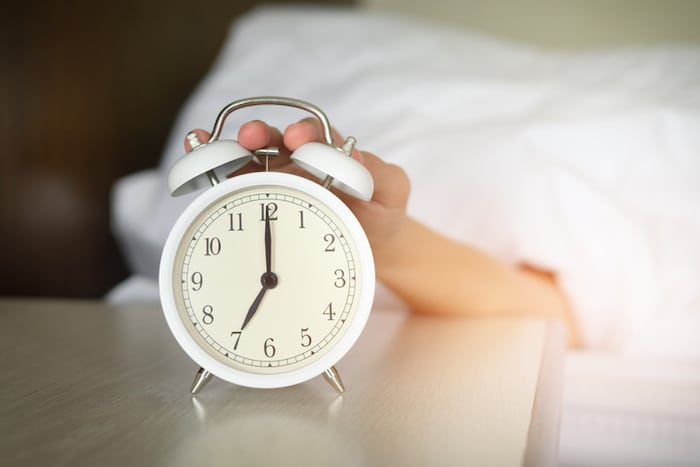
5 Tips to sleep Smarter
1. Employ strategic drinking
“There’s a really big difference between going to sleep and passing out,” Dr. Breus jokes. While alcohol can make us feel sleepy, it actually pushes out stages three and four of sleep for less effective beauty sleep overall. Not to mention alcohol also acts as a diuretic, resulting in more frequent bathroom breaks throughout the night. To optimize your sleep after drinking, he recommends chasing every alcoholic drink with a glass of water and also stopping alcohol intake at least three hours before bed.
Similarly, you should be equally mindful of your caffeine habits. Dr. Breus suggests cutting off caffeine after 2 p.m. “Caffeine has a half-life between six and eight hours. Even for people who can still fall asleep easily after having coffee at night, if we measure the quality of sleep you’re getting, it’s horrible quality sleep.”
2. Prioritize daily exercise
“Do you have to run a marathon? No. But twenty minutes of some type of cardiovascular exercise each day is a great idea, assuming your doctor tells you it’s okay,” Dr. Breus explains. However, he recommends avoiding exercise right before bed. Why? It increases your core body temperature, which may confuse your body. “Sleep follows your core body temperature cycle, which naturally drops around 10:30 p.m. and signals your brain to release melatonin. If you raise your core body temperature, it makes it harder to fall asleep,” he shares.
3. Power down before bedtime
Dr. Breus suggests you ease yourself into sleep by reserving the hour before bed to wind down. “Sleep is not an on/off switch,” he says. “It’s more like slowly pulling your foot off the gas, and slowly putting your foot on the brake.” He likes to divide the hour before bed into three 20-minute segments. The first 20 minutes are for preparing for the day ahead with any small tasks, then 20 minutes for hygiene and skincare, and finally, 20 minutes for meditation or prayer. “Whatever gets you to chill out,” he encourages.
4. TV is okay, but avoid using electronic devices in bed
That’s right! “I’m probably the only sleep doctor in the universe that says it’s okay to fall asleep with the television on,” Dr. Breus admits. After studying this habit in his lab and his personal home, he found that most bedtime TV watchers had a passive relationship with the content. However, the opposite is true with personal electronics. “There’s much more emotional engagement there,” he explains. To fall asleep easier, avoid any devices that require holding, scrolling, and tapping. And if watching television, this is not the time for season finales! Opt for reruns or other low-engagement programming.
5. Wake up at the same time every day
“Keeping a consistent wake-up time is the most important thing you can do from a circadian rhythm standpoint,” Dr. Breus says. That’s right, not a consistent bedtime—but a consistent wake-up time. He also suggests getting 15 minutes of sunlight each morning upon waking. “When light comes in, it turns off the melatonin faucet in your head and resets your circadian rhythm. The more consistently you do that every day, the more your entire body knows how to handle the rest of the day.”
To get more tips and insight from the Sleep Doctor, follow him on Instagram, find him online, or on shelves at bookstores. For more on better beauty sleep, read all about Mighty Night, our new overnight skin repair and cell recovery supplement.
